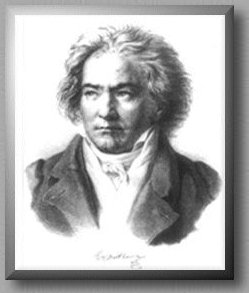
|
Beethoven, Ludwig van a German composer, generally considered one of the greatest composers in the Western tradition. Born in Bonn, Beethoven was reared in stimulating, although unhappy, surroundings. His early signs of musical talent were subjected to the capricious discipline of his father, a singer in the court chapel. In 1789, because of his father's alcoholism, the young Beethoven became a court musician in order to support his family. His early compositions under the tutelage of German composer Christian Gottlob Neefe—particularly the funeral cantata on the death of Holy Roman Emperor Joseph II in 1790—signaled an important talent, and it was planned that Beethoven study in Vienna, Austria, with Wolfgang Amadeus Mozart. Although Mozart's death in 1791 prevented this, Beethoven went to Vienna in 1792 and became a pupil of Austrian composer Joseph Haydn. Beethoven's fame reached its zenith during these years, but the steadily worsening hearing impairment that he had first noted in 1798 led to an increasing sense of social isolation. Gradually, Beethoven settled into a pattern of shifting residences, spending summers in the Viennese suburbs—Heiligenstadt was a favorite choice—and moving back to the city each autumn. In 1802, in his celebrated “Heiligenstadt Testament,” a quasi-legal letter to his two brothers, he expressed his agony over his growing deafness. After 1805 all accounts of Beethoven's eccentricities multiplied. He performed in public only rarely and made his last such appearance in 1814. That is just part of Beethoven’s life.
Quote: I want to seize fate by the throat. Ludwig van Beethoven |

Symphony No.3 in Eb 'Eroica'
1.Allegro con brio |
2.Marcia funebre |
3.Scherzo: Allegro vivace |
4.Finale |
|
[Home] [Myself] [Bach] [Mozart] [Rimskly] [Chopin] [Stravinsky] [Beethoven] [Tchaikovsky] [Haydn] [Verdi] [Vivaldi] [Rachmaninov] [Links] [Awards] [My Award]
Guestbook Email Geocities